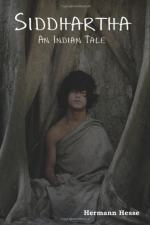|
This section contains 1,635 words (approx. 5 pages at 400 words per page) |

|
In the following essay, Bennett, a doctoral student at the University of California, Santa Barbara, and adjunct instructor in English, explains that while Siddhartha draws heavily from Eastern religions in its themes, Hesse's philosophy diverges in some ways, and the author concludes that one's philosophy is a personal journey for each individual to discover.
Clearly, the most obvious and significant aspect of Hermann Hesse's Siddhartha is its use of images, themes, and ideas drawn from Eastern religions. Having both traveled to India and studied extensively about Indian religions, Hesse was able to integrate a substantial understanding of Eastern religious traditions into his novel. In fact, Siddhartha does such a good job of developing Eastern religious themes that it has been published in India, and Indian critics have generally praised its sensitive understanding of their religious traditions.
From beginning to end, virtually every aspect of Siddhartha develops out...
|
This section contains 1,635 words (approx. 5 pages at 400 words per page) |

|




